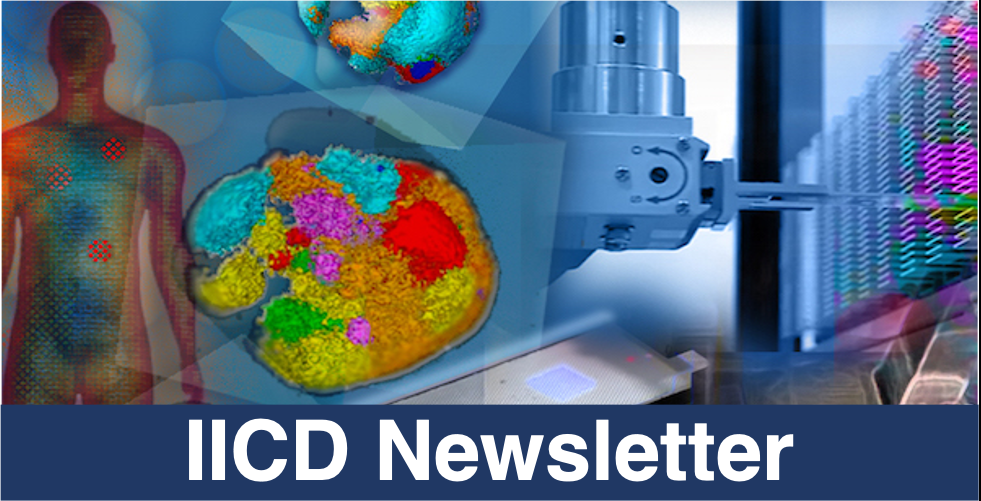|
Notes from the Lab: a Framework for Modeling Cancer Evolution in Single Cell
|
|
|
|
|
Dr. Khanh Dinh (Simon Tavaré's group) developed a mathematical model to track tumor development over time. When applied to general DNA-seq data, the model maps the DNA change patterns across the cancer genome to quantitative scores for individual chromosomes. These scores have shown remarkable agreement with different gene types located on these chromosomes, therefore proving the model’s biological relevance.
|
|

The Role of Archaic Admixture in Human Evolution
j
Hosted by Itsik Pe'er, PhD
Date: May 3rd, 2023 at 2 PM (ET)
Location: Schermerhorn Hall 603 and via Zoom
Light refreshments will be served
|
|
|
Next Speaker in the IICD Seminar Series
|
|
|
|

Protein Interaction Variation and Cancer
j
Hosted by Elham Azizi, PhD
Date: May 17, 2023 at 2 PM (ET)
Location: online via Zoom
|
|
 Congratulations to Kevin Hoffer-Hawlik (Azizi and McFaline-Figueroa labs) who was awarded an NSF Graduate Research Fellowship for his project titled “Modeling dynamic tumor-immune interactions in melanoma in response to immunotherapy using machine learning and multiplexed scRNA-seq experiments." Read more. Congratulations to Kevin Hoffer-Hawlik (Azizi and McFaline-Figueroa labs) who was awarded an NSF Graduate Research Fellowship for his project titled “Modeling dynamic tumor-immune interactions in melanoma in response to immunotherapy using machine learning and multiplexed scRNA-seq experiments." Read more.
|
|
 Francesco Cambuli joined the Technology Innovation Lab (Sanja Vickovic) at the New York Genome Center as a senior scientist. Francesco is developing novel technologies that enable massively-parallel screening of gene functions, drugs, and microenvironmental cues, using clinically-relevant disease models and content-rich, multimodal single-cell readouts. Francesco Cambuli joined the Technology Innovation Lab (Sanja Vickovic) at the New York Genome Center as a senior scientist. Francesco is developing novel technologies that enable massively-parallel screening of gene functions, drugs, and microenvironmental cues, using clinically-relevant disease models and content-rich, multimodal single-cell readouts.
|
|
 Hans-Hermann Wessels is a senior scientist in the Technology Innovation Lab (Sanja Vickovic) at the New York Genome Center. Hans-Hermann is focusing on the development of novel technologies that enable massively-parallel screening of gene functions using content-rich, multimodal single-cell readouts. Hans-Hermann Wessels is a senior scientist in the Technology Innovation Lab (Sanja Vickovic) at the New York Genome Center. Hans-Hermann is focusing on the development of novel technologies that enable massively-parallel screening of gene functions using content-rich, multimodal single-cell readouts.
|
|
|
Call for Submission (ICML Workshop on Computational Biology)
|
|
|
The ICML Workshop on Computational Biology (WCB) will highlight how machine learning (ML) approaches can be tailored to making both translational and basic scientific discoveries with biological data, such as genetic sequences, cellular features or protein structures and imaging datasets, among others. This workshop thus aims to bring together interdisciplinary ML researchers working in areas such as computational genomics; neuroscience; metabolomics; proteomics; bioinformatics; cheminformatics; etc. Deadline for paper submissions is May 17th.
|
|
|
Recent Publications from IICD Researchers
|
|
|
|
A Statistical Framework for Analyzing Shape in a Time Series of Random Geometric Objects. van Delft, A.; Blumberg, A. J. ArXiv 2023.
Contamination Source Modeling with SCRuB Improves Cancer Phenotype Prediction from Microbiome Data. Austin, G. I.; Park, H.; Meydan, Y.; Seeram, D.; Sezin, T.; Lou, Y. C.; Firek, B. A.; Morowitz, M. J.; Banfield, J. F.; Christiano, A. M.; Pe'er, I.; Uhlemann, A. C.; Shenhav, L.; Korem, T. Nat Biotechnol 2023, in press.
SEACells Infers Transcriptional and Epigenomic Cellular States from Single-Cell Genomics Data. Persad, S.; Choo, Z. N.; Dien, C.; Sohail, N.; Masilionis, I.; Chaligne, R.; Nawy, T.; Brown, C. C.; Sharma, R.; Pe'er, I.; Setty, M.; Pe'er, D. Nat Biotechnol 2023, in press.
Systematic Assessment of Prognostic Molecular Features across Cancers. Santhanam, B.; Oikonomou, P.; Tavazoie, S. Cell Genom 2023, 3 (3), 100262.
|
|
|
|
|


